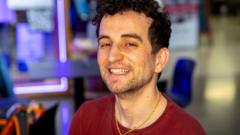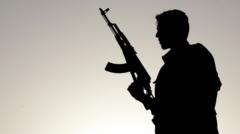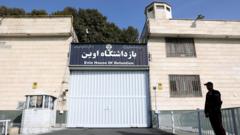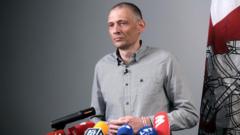**René and Nujeen illustrate the challenges and dreams of a war-torn nation dreaming of freedom and acceptance.**
**Emergence from Darkness: Syrian Voices of Resilience Amidst Change**

**Emergence from Darkness: Syrian Voices of Resilience Amidst Change**
**As Syria finds hope post-Assad, survivors share their stories of trauma and courage**
René Shevan stands before a small music box, a relic of his home in Syria, now serving as a poignant reminder of the past and a promise for the future. "This is all I have left of my home," he reflects, listening to the familiar tune that evokes memories of a time before the brutal regime of Bashar al-Assad marred his life. René's narrative is one of resilience, brutality, and newfound strength; after years of oppression, he finally feels free to display his identity.
Having endured unspeakable horrors in the Syrian prisons, René opens up about the trauma he experienced due to his sexuality and his participation in pro-democracy protests. Twelve years since his escape, he reveals the pain of witnessing others suffer similar fates: “There was a woman pleading in the corner… a boy crying for his mother as he was assaulted.” Revisiting these memories, he now recognizes a glimmer of hope as he witnesses others, like him, reclaiming their freedom.
"I'm not in prison now," René asserts through tears as he reminisces about the images of former prisoners celebrating in Damascus. His memories, though haunting, now coexist with the hope that change may finally be on the horizon. With Assad's regime crumbling, René, who once feared showing his face to the camera, has courageously stepped into the light to reclaim his narrative. "Because the republic of fear is gone," he explains, focusing on the future where he hopes for a Syria governed by freedom and equality, welcoming all communities regardless of sexual orientation.
But René is realistic about the challenges that remain. The new leadership may still pose threats to LGBTQ+ individuals and other marginalized groups, and many Syrians who fought for change lost their lives simply for being who they are. "The regime killed them just because they were LGBT, and because they were part of the revolution," he expresses somberly.
Similar sentiments echo through the story of Nujeen, a disabled Kurdish girl transformed by her experiences. Having fled the violence in Syria and settled in Germany, Nujeen—a once bright-eyed teen aspiring to be an astronaut—now faces the complexities of returning to a homeland that may not be welcoming to her or others like her.
Having traversed treacherous routes as a refugee, Nujeen now reflects on the recent fall of Assad, understanding that true change will require more than just the absence of a dictator. “The real challenge begins,” she cautions, as she emphasizes the importance of a country where diversity is not merely tolerated, but celebrated.
Both René and Nujeen symbolize hope for a future that allows all Syrians to redefine their identities, free from the shadows of oppression and fear. Together, they remain committed to turning the page on a painful past, striving for a more inclusive and loving Syria. “We can and will be a better nation,” Nujeen believes. “A nation of love, acceptance, and peace.”
Having endured unspeakable horrors in the Syrian prisons, René opens up about the trauma he experienced due to his sexuality and his participation in pro-democracy protests. Twelve years since his escape, he reveals the pain of witnessing others suffer similar fates: “There was a woman pleading in the corner… a boy crying for his mother as he was assaulted.” Revisiting these memories, he now recognizes a glimmer of hope as he witnesses others, like him, reclaiming their freedom.
"I'm not in prison now," René asserts through tears as he reminisces about the images of former prisoners celebrating in Damascus. His memories, though haunting, now coexist with the hope that change may finally be on the horizon. With Assad's regime crumbling, René, who once feared showing his face to the camera, has courageously stepped into the light to reclaim his narrative. "Because the republic of fear is gone," he explains, focusing on the future where he hopes for a Syria governed by freedom and equality, welcoming all communities regardless of sexual orientation.
But René is realistic about the challenges that remain. The new leadership may still pose threats to LGBTQ+ individuals and other marginalized groups, and many Syrians who fought for change lost their lives simply for being who they are. "The regime killed them just because they were LGBT, and because they were part of the revolution," he expresses somberly.
Similar sentiments echo through the story of Nujeen, a disabled Kurdish girl transformed by her experiences. Having fled the violence in Syria and settled in Germany, Nujeen—a once bright-eyed teen aspiring to be an astronaut—now faces the complexities of returning to a homeland that may not be welcoming to her or others like her.
Having traversed treacherous routes as a refugee, Nujeen now reflects on the recent fall of Assad, understanding that true change will require more than just the absence of a dictator. “The real challenge begins,” she cautions, as she emphasizes the importance of a country where diversity is not merely tolerated, but celebrated.
Both René and Nujeen symbolize hope for a future that allows all Syrians to redefine their identities, free from the shadows of oppression and fear. Together, they remain committed to turning the page on a painful past, striving for a more inclusive and loving Syria. “We can and will be a better nation,” Nujeen believes. “A nation of love, acceptance, and peace.”




















